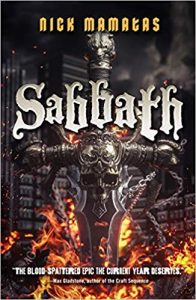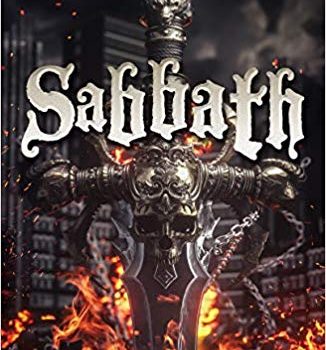Ian Mond Reviews Sabbath by Nick Mamatas
 Sabbath, Nick Mamatas (Tor 978-1250170118, $27.99, 304pp, hc) November 2019.
Sabbath, Nick Mamatas (Tor 978-1250170118, $27.99, 304pp, hc) November 2019.
Sabbath is a book I would generally avoid. One: it’s an adaptation, a literary sub-genre I understand is very popular (see all the books based on console games) but which I find to be surplus to requirement given the thousands of original works I’ve yet to read. Two: the source material, Matthew Tomao & Josh Medor’s Sabbath: All Your Sins Reborn, is a graphic novel I’ve never heard of (neither has anyone else if the internet is any judge). Three: it sports a cover with a flaming sword and skull-embossed pommel that screams generic. Yet it’s one aspect of the cover, the name of the author, that’s led me to review the novel for Locus. In my humble opinion, Nick Mamatas is one of the most inventive, fascinating, and distinctive voices in the field, a writer whose career I will follow even if it means reading a comic book adaptation.
Hexen Sabbath is an 11th-century warrior with a massive appetite for drink, women, and slaughtering pagans. When he discovers, on the battlefield of all places, that the Danes he’s been enlisted to slice and dice are in fact Christians (and have been for generations) he suffers an existential crisis – “The world is fallen; men like us should not be butchering one another like animals!” – which lasts as long as the first javelin that skewers his body. On the point of death, Sabbath is transported to present-day New York by Abathar, an Angel of the Lord. The Angel tasks him with the mission to lop off the heads of the Seven Deadly Sins, who have taken on human form and plan to bring about the apocalypse in seven days. Abathar provides Sabbath with a tattooed map on his arm showing the location of each Sin and a mental download of Wikipedia so he can more easily navigate this strange new environment. It doesn’t take long for Sabbath to steal some clothes, get maced in the face while saving a damsel in distress, have sex with same damsel (her name is Jennifer Zelenova), and then, armed with a sword (helpfully procured by Jennifer from a private collector), find and dispatch the first Sin.
The novel’s episodic structure – Sabbath hunts, confronts and vanquishes each Sin – and the on-the-nose representation of some of the Sins (Lust is a high-end sex worker, Greed is a Wall Street banker, Gluttony is a gourmand chef) could have made for a dull, predictable, repetitive read. But that’s not Mamatas’s style. From the opening chapter, which ends with Sabbath’s epiphany and farcical death, Mamatas signals his intention to have fun with the absurd premise and its larger-than-life hero. Sabbath’s observations of a world ten centuries removed from his own are insightful and funny. He is “chagrined” to discover that he’s now shorter than the men around him, “even if most of them were flabby, with bellies that preceded them into the room.” The fish-out-of-water routine, though, doesn’t grate, because rather than a cut-and-paste caricature of Conan, Mamatas provides Sabbath with a level of self-awareness, a natural curiosity that makes him endearing. At the same time, Jennifer’s unvarnished and genuine reactions to the insanity that intrudes into her life grounds the story. Her relationship with Sabbath and Miriam (her on-again, off-again girlfriend who’s an expert in all things Gnostic and spiritual) injects the novel with heart.
Where Sabbath really shines is how Mamatas recasts the Sins from their traditional role as a cautionary tale and a reinforcement of normative Christian values to critics of our current cultural and political malaise. Lust passionately expounds on the stupidity of men and the failure of women to form a sisterhood and overthrow the patriarchy. Greed, in one of the best sections of the novel, makes a horribly persuasive case for late-stage capitalism:
Correct me if I’m wrong, but in the feudal era, most people lived lives of privation and misery. Greed solved all that…. Successful people generate so much wealth, so many untold riches, that even the poor people of this time have food, heated homes, and cell phones with all the world’s knowledge in their pockets. Even the homeless people in this city are better off than the peasants of your time.
To top it all off Pride, a Twitter-obsessed, New York real estate magnate running for President (sound familiar?), reminds us that this world of Pepe memes, clickbait articles, and Fake News is one of our own making.
As I’ve not read the original comic, I can’t say how much of the plot or the Socratic dialogues between Sabbath and the Sins are replicated in Tomao & Medor’s work. But I’ve read enough of Nick’s fiction and non-fiction to know that the sensibilities that drive Sabbath, that make it so thoughtful, socially aware, and wickedly funny, are all his.
Ian Mond loves to talk about books. For eight years he co-hosted a book podcast, The Writer and the Critic, with Kirstyn McDermott. Recently he has revived his blog, The Hysterical Hamster, and is again posting mostly vulgar reviews on an eclectic range of literary and genre novels. You can also follow Ian on Twitter (@Mondyboy) or contact him at mondyboy74@gmail.com.
This review and more like it in the November 2019 issue of Locus.
 While you are here, please take a moment to support Locus with a one-time or recurring donation. We rely on reader donations to keep the magazine and site going, and would like to keep the site paywall free, but WE NEED YOUR FINANCIAL SUPPORT to continue quality coverage of the science fiction and fantasy field.
While you are here, please take a moment to support Locus with a one-time or recurring donation. We rely on reader donations to keep the magazine and site going, and would like to keep the site paywall free, but WE NEED YOUR FINANCIAL SUPPORT to continue quality coverage of the science fiction and fantasy field.







